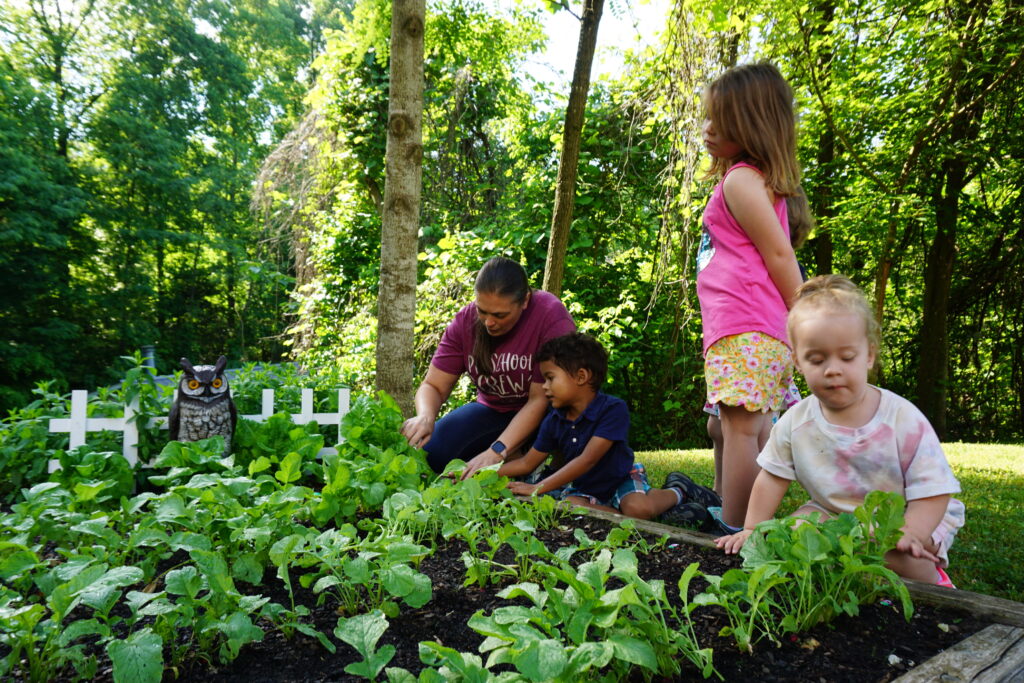Farm to Early Care and Education
go.ncsu.edu/readext?251131
en Español / em Português
El inglés es el idioma de control de esta página. En la medida en que haya algún conflicto entre la traducción al inglés y la traducción, el inglés prevalece.
Al hacer clic en el enlace de traducción se activa un servicio de traducción gratuito para convertir la página al español. Al igual que con cualquier traducción por Internet, la conversión no es sensible al contexto y puede que no traduzca el texto en su significado original. NC State Extension no garantiza la exactitud del texto traducido. Por favor, tenga en cuenta que algunas aplicaciones y/o servicios pueden no funcionar como se espera cuando se traducen.
Português
Inglês é o idioma de controle desta página. Na medida que haja algum conflito entre o texto original em Inglês e a tradução, o Inglês prevalece.
Ao clicar no link de tradução, um serviço gratuito de tradução será ativado para converter a página para o Português. Como em qualquer tradução pela internet, a conversão não é sensivel ao contexto e pode não ocorrer a tradução para o significado orginal. O serviço de Extensão da Carolina do Norte (NC State Extension) não garante a exatidão do texto traduzido. Por favor, observe que algumas funções ou serviços podem não funcionar como esperado após a tradução.
English
English is the controlling language of this page. To the extent there is any conflict between the English text and the translation, English controls.
Clicking on the translation link activates a free translation service to convert the page to Spanish. As with any Internet translation, the conversion is not context-sensitive and may not translate the text to its original meaning. NC State Extension does not guarantee the accuracy of the translated text. Please note that some applications and/or services may not function as expected when translated.
Collapse ▲Farm to Early Care and Education (Farm to ECE) enhances the health and education of young children, birth to age six, by developing systems and experiential learning that connect children and their families with local food and farms. It includes any type of activities in ECE environments that incorporate local foods through meals and snacks, taste tests, lessons, farmer visits, cooking, growing food, and/or community and parent involvement.

| NC Farm to ECE Programs | Guides & Toolkits | |
| National Resources | Funding Opportunities | |
- NC Farm to Early Care and Education Initiative: NC Farm to Early Care and Education (NC F2ECE) connects local farms with local childcare centers to empower the development of community-based, equitable food systems. To achieve this goal, CEFS and its partner organizations assist in developing food procurement systems, connecting resources and people across food systems and early childhood education, and providing children with experiential ways to engage with food.
- Wake County Farm to Child Care Project: Summary of a 9-week Farm to Child Care pilot conducted by Advocates for Health in Action (AHA) and partners Wake County Cooperative Extension and Wake County SmartStart (WCSS).
- Growing Minds – Farm to Preschool: Appalachian Sustainable Agriculture Project
- Preventing Obesity by Design – Wake Project: Incorporating production gardens into childcare Outdoor Learning Environments. A project of the Natural Learning Initiative.
:Guides & Toolkits
NC State Extension Publications:
- Composting in Childcare Center Production Gardens
- Vermicomposting in the Childcare Center Production Gardens
- School Garden Veggie Planting Guide: Mountains, Piedmont/Coastal
- Veggie Planting Guide- Spin the Wheel: Mountains, Piedmont/Coastal
- Food Safety for School Gardens
- Community Gardening Handbook
- Poisonous Plant List for Childcare Providers
- Soil Testing: Gardeners Guide, Picture Guide, How-to Video, Soils Lab
- NC State Extension Gardening Portal, Growing: Vegetables, Fruit, Herbs
Other Guides & Toolkits:
- “I Tried Local…” A Toolkit for Engaging Kids with Local Food and Farms: ASAP’s Growing Minds program provides a flexible curriculum that includes 10 units based on foods grown in North Carolina: blueberries, broccoli, carrots, green beans, mushrooms, peppers, radishes, sugar snap peas, sweet corn, and watermelons. The curriculum is also available in Spanish.
- Wake County Farm to Childcare Toolkit: “This toolkit is designed to assist child care center and family child care home directors and staff to take the concept of Farm to Child Care and put it into action. Resources included here will help directors, cooks and teachers implement Farm to Child Care: such as where to purchase North Carolina grown produce, menu planning, activities for the classroom to recipes for fresh, healthy and tasty meals by season.”
- The Green Desk: A resource of North Carolina’s Natural Learning Initiative, “The Green Desk is for early childhood educators, childcare providers, administrators, and professionals seeking the latest information to create high quality, healthy outdoor environments for young children.”
:National Resources
- Farm to Preschool Network: This organization is working to establish “a cohesive network of farm to preschool-type programs and stakeholder agencies and organizations across the nation.” Find the following information, and more, on the Network’s website.
:Funding Opportunities
- National Head Start Association: Up to $250, must be a Head Start program and member of National Head Start Association



